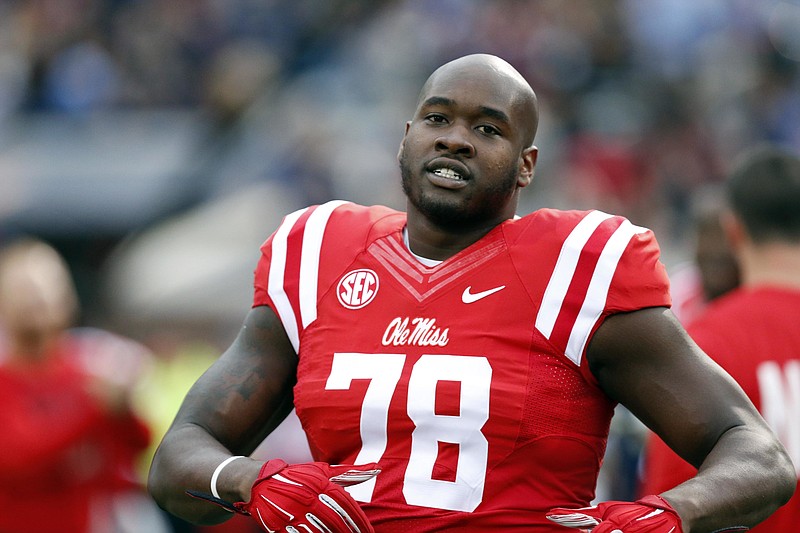An NCAA Division I coach of a revenue-producing sport, my friend would gather his players together at the start of every season with the same simple message.
In a room where no one else could see or hear him, he would tell them: "If you need something, come tell me and we'll do our best to take care of it. If you want, forget it (though he may have used a few more colorful words than that)."
His point was unmistakable: NCAA rules or not, we're going to do what we can to help you and your family in a time of need. But needing money to pay your mom's power bill or to go home for Christmas is not the same as wanting a 50-inch TV or a 10th pair of Nike Air Jordans.
All of which brings us to former Ole Miss football player Laremy Tunsil and his recent comments during the first round of the NFL draft that he received improper benefits from the coaching staff, including money to pay his mom's power bill.
Unfortunately, Tunsil wasn't much of a sympathetic figure long before the Internet leak of him smoking on a bong through a gasmask on draft night. He had been forced to sit out the first seven games of his senior season due to what the NCAA termed "impermissible benefits," including the use of a loaner car he never paid for.
When it comes to wants and needs, Tunsil's priorities were as hazy as the smoke inside that bong.
Beyond that, for all who view the NCAA as heartless and compassionate, its little-known Student Assistance Fund already helps cover the cost of traveling to a funeral, summer school expenses a scholarship might not pay or replacing items lost in a natural disaster. Through that program the NCAA dispersed more than $73 million to its member institutions for the 2013-14 school year, which was used by more than 80,000 student-athletes.
But regardless of what the NCAA ultimately decides regarding Ole Miss, it's time to embrace the truth first uttered by former Georgetown basketball John Thompson: "Just because you're breaking NCAA rules doesn't mean you're doing something morally wrong."
This isn't to say that any rule Thompson may have broken was 100 percent for the benefit of the kid he helped. It also likely helped the Hoyas win games, just as anything that kept Tunsil free of worry and focused on winning football games hugely helped the Rebels.
Every time a coach or booster lines the pockets of an athlete, there's always a whiff, if not an overwhelming stink of hypocrisy to the notion that it was strictly done for moral reasons. When it's discovered that all these multimillionaire coaches are slipping a few thousand to the kid who can't walk and chew bubblegum at the same time, but also can't help his mom without a sizable handout, then we'll buy all the moral stuff.
But to know the backgrounds of so many of these kids, the sheer volume of their basic needs, is to also appreciate, however grudgingly, that the result of such help quite often justifies the murky means.
To be blunt, however well-intentioned and helpful the Student Assistance Fund, the NCAA needs to go further.
Let every school in the NCAA, from Division I to Division III, appoint one staff member to handle hardship requests from its student-athletes. A different fund can be set up at NCAA headquarters in Indianapolis, its money derived from 3 percent of the NCAA's profits from all its championships and individual conference profits.
Each time an athlete has what he or she considers a "need," the athlete makes a request through the school's in-house contact, who then consults a lay committee of three who's always on call (via a healthy salary, of course) to the NCAA during business hours. Each request is to take no more than 72 hours for a reply.
And to hammer home the point that to whom much is given, much is expected, those athletes who wind up with millions of dollars enter into a joint agreement with their professional leagues to pay that hardship money back.
Why should the NFL, NBA and such get involved? Mostly because without their approval and policing - no player takes the field or court until a legal document from the athlete agreeing to repay the money in a timely fashion is filed in each league's headquarters - the athletes might never repay it.
If nothing else, it teaches responsibility and integrity, two traits in far too short supply these days in all segments of society.
And those who don't make the pros? That's up to the schools. They can pursue their payback if the athlete goes on to great financial success in something other than sports. Or they can simply eat the money, comforted by the notion that they did something morally right.
There are rules the NCAA should never relax. Academic integrity (here's looking at you, North Carolina) both in the admissions department and retaining eligibility through fraudulent means. Any financial arrangement that lures a player to a school. Any manipulation of the legal system to protect an athlete.
But compassion and empathy also are important, particularly in this era when the rich grow richer and the poor poorer, as witness one study that concluded 85 percent of the athletes in football and men's basketball grew up below the poverty line.
Because of that, we should strive to respond to real need whenever possible.
That we don't always seem to want to do that may be what's really morally wrong in the country these days in far more places than big-time college athletics.
Contact Mark Wiedmer at mwiedmer@timesfreepress.com.
